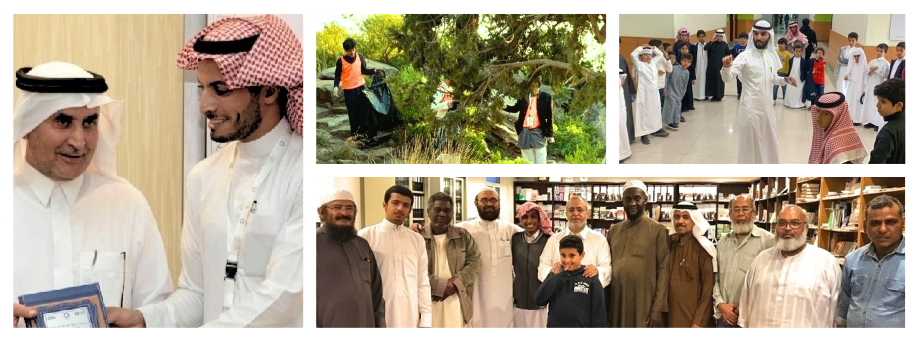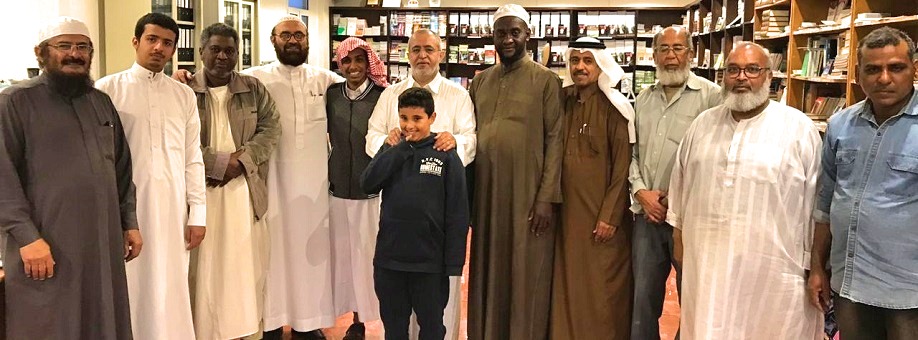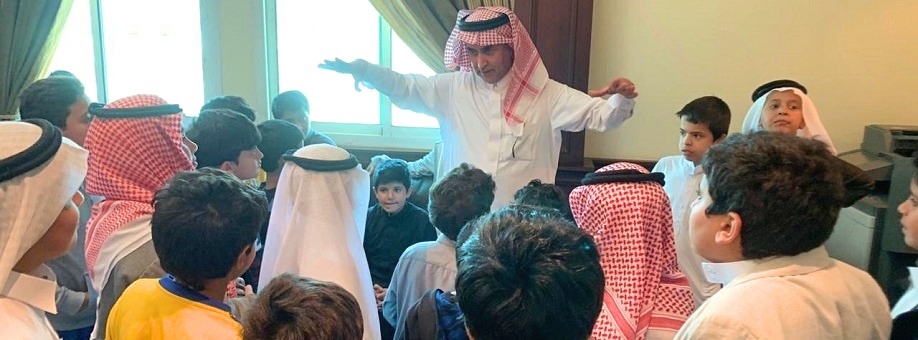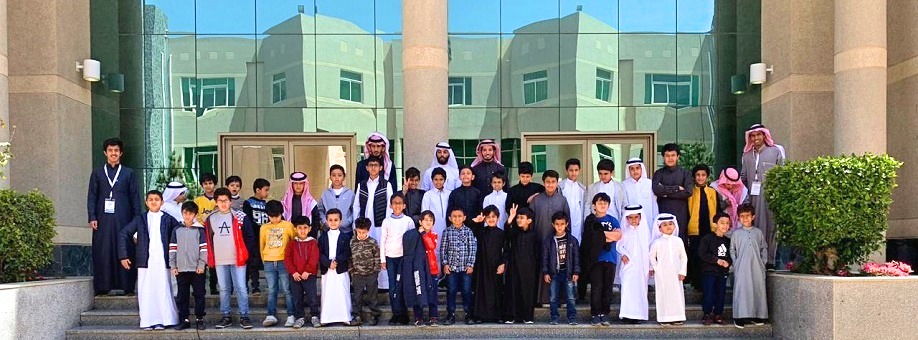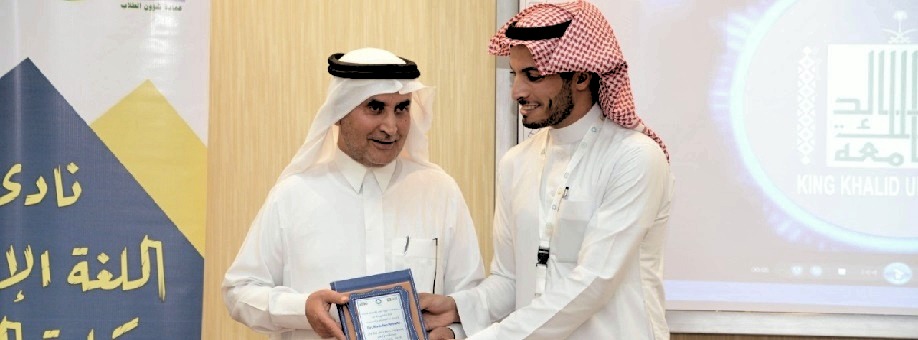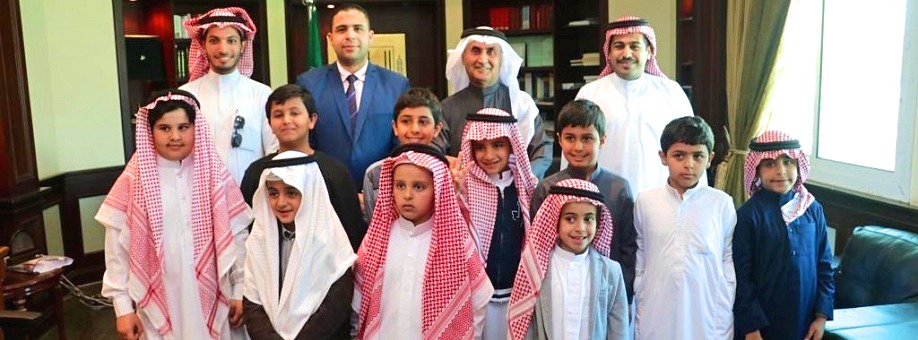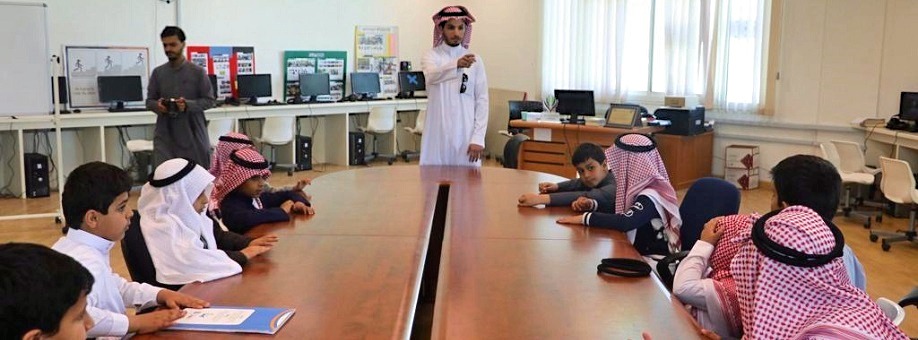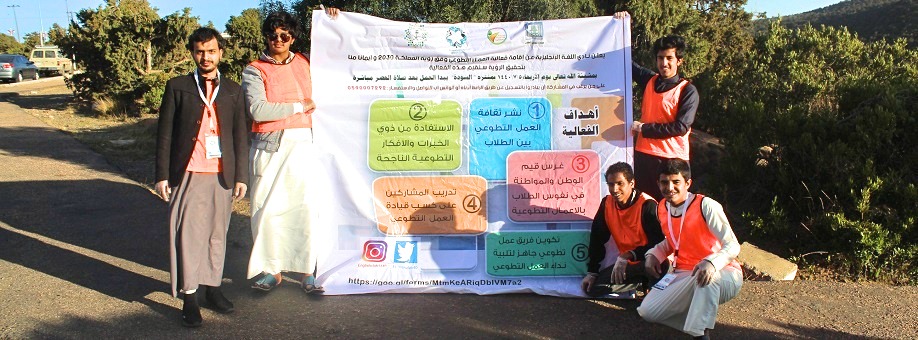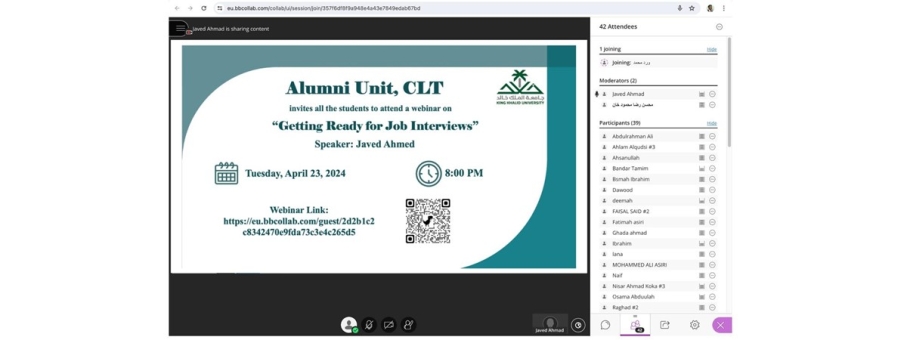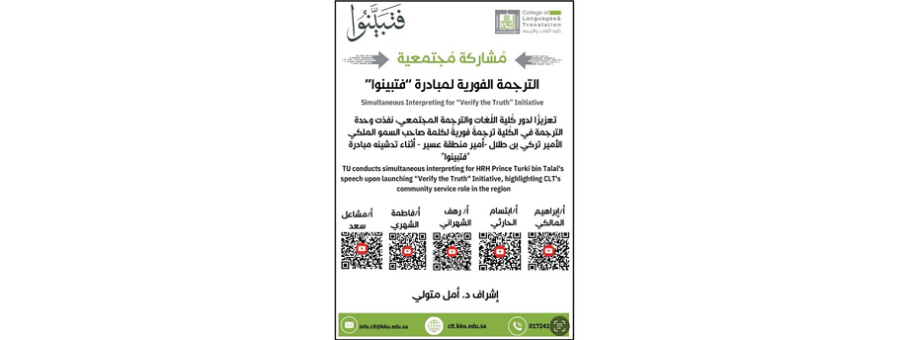Introduction
The English Club is sponsored by the Faculty of Languages and Translation (FLT), and operated under the guidance of one faculty director and one student leader. The English Club has three primary objectives: English language skills development, community service and supporting higher education.
Recently, the English Club has been extremely active and busy. Due to the sheer volume, scope and variety of worthwhile club events, the English Club news is published in aggregate fashion as follows:
Team Up to Clean Up and Green Up
Club members conducted a volunteer clean-up day in a public park nestled in the Al-Souda mountains. For several hours the volunteers picked up trash and debris in order to beautify the park. The participants also learned about the benefits of recycling and litter-free environments. Local community members were thrilled with the results, and hope to join the English Club with additional volunteers for future clean-up days. Expanding this program will lead to the beautification of more areas and increased public environmental awareness.
School Children Get a Glimpse of University Life
One English Club priority is promoting higher education, and it's always helpful to start early. The club, led by director Faisal Alfadhil, recently hosted classes from the Al-Andalus Elementary School and Excellent Education Schools from Abha. Each class toured the university facilities and had the opportunity to speak with university students, faculty members and staff. The grade school students had a lot of fun seeing the university and asking questions.
The purpose of hosting these visits is to show children that universities are safe, supportive and welcoming places. When they reach young adulthood, they may not remember the details of their visit to KKU. But they will likely recall that visiting the university was a positive experience. This will encourage young adults to pursue advanced education once they graduate high school.
Electronic Gaming Competition - An Outlet for Stress
For several weeks members of the English Club sponsored an electronic gaming competition. The selected game was FIFA 19. More than 60 FLT students competed in the event. After much fierce but friendly competition, FLT student Mohammed Dhafer took first place. The purposes of the event were to give the students a stress relieving break from their rigorous academic obligations, and to promote good sportsmanship. Everyone had a fine time and congratulated Mohammed Dhafer on his hard-won victory.
Weekly Coffee Talk at the LEP
The English Club established a standing program titled 'Coffee Talk'. Each Wednesday the Club hosts a gathering in the LEP. The purposes of this program are to help students improve their language skills through informal conversations, and short faculty presentations on a variety of language learning topics. These gatherings are also an opportunity for students to socialize and exchange ideas.
Coffee Talk is every Wednesday at noon in the LEP (room A/3/1) at the end of the hall of FLT classrooms. All students are welcome. Refreshments are available.
English Club Closing Ceremony for Spring 2019
The English Club has been very busy this Spring. As the semester winds down, the club members took a few moments to look back and reflect upon all of the events and activities conducted during the school year. Therefore, the English Club hosted a year-end review meeting last week.
FLT Dean Abdullah Al-Melhi sponsored the event, with English Club Director Faisal Alfadhil and Student Body English Club President Abdulaziz Dahlan serving as master of ceremonies. In his opening remarks, Dean Al-Melhi commended the English Club members and the club director for all of their hard work. 'Naturally, the English Club helps current FLT students improve their language skills, which is inherently valuable. As highly noteworthy additional benefits, the club serves the community, promotes good citizenship and encourages higher education to young people. We hope to expand the English Club membership to include more of our students and increase community outreach efforts' he said. The Dean further explained that extracurricular activity involvement teaches students to manage their time and broadens their university experience.
The English Club presented a video montage chronicling many of the events that occurred over the last few months. Subsequently, there was an awards ceremony recognizing numerous faculty members who participated in various English Club functions. Current club director Faisal Alfadhil thanked former club director Khalid Al-Qasemi for all of his foundational work with the English Club, and for ensuring a smooth transfer of leadership responsibilities.
English Club Answers the Call in Time of Crisis
The English Club took on an unplanned community service project in the wake of the New Zealand mosque massacres. Due to this most unfortunate event, there is a shortage of Holy Qurans and other Islamic material in the nation of New Zealand. The English Club has answered the call to help remedy this situation.
The club is working with the Mada Program to collect and transport Holy Qurans, books and related materials to mosques and religious centers on the remote island nation. Electronic Dawah Project (EDPr) Director and former FLT Dean, Dr. Abdullah Abu Eshy, said he knew he could count on KKU and the FLT to help. 'We cannot undo this tragedy, but we will do everything in our power to provide aid and comfort to the families and communities suffering in the aftermath. I am proud of the English Club members for volunteering in this time of need. Their efforts are critical. Our wounded brothers and sisters are far away, but they are not alone' he said. Prof. Abdallah Hady Al-Kahtany, former Dean of Faculty Affairs, explained that the purpose of the volunteer project was to provide books to those who wish to discover and learn about Islam from authentic sources. 'I am happy these young men came out tonight for a noble cause. Our work does not stop here. We will respond to all requests that come our way and play our part in helping to spread the correct message of Islam', said Prof. Al-Kahtany.
Conclusion
The English Club thanks all of its members for a highly productive year. The club also thanks Dean Al-Melhi, Vice Dean, Dr. Yahya Asiri, and Chairman, Dr. Munassir Alhamami, for their continuing patronage and guidance. The university and the FLT are committed to continuous improvement in academics and ever-expanding social outreach programs. The English Club is an effective means of fulfilling these objectives. The club has an open invitation to students who would like to join and participate in this worthwhile venture.
Date: 3/22/2019
Source: Faculty of Languages and Translation

